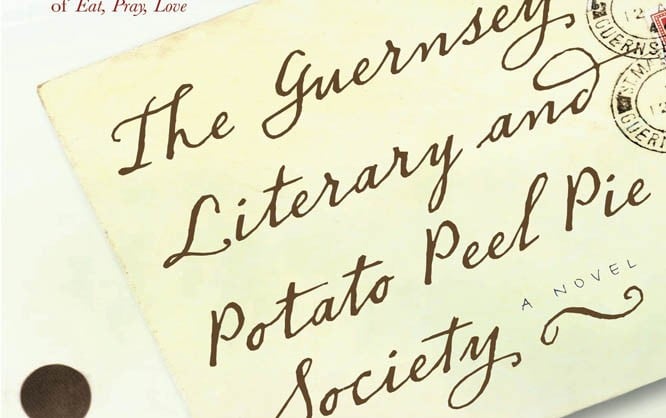
An exploration of life under Nazi occupation on the Island Guernsey and the quiet local rebellion in the guise of a literary society

The Guernsey Literary and Potato Peel Pie Society is the book equivalent of a long, warm hug from someone you love. Populated by winsome characters whom you feel you have known perhaps your whole life, the tale is a charming epistolary told from the perspective of Juliet Ashton, a female writer during World War II (WWII) who has found success penning a humorous column that made light of the terrible atrocities Britain, and indeed Europe at large, suffered during the disastrous war.
The novel begins in 1946 as the war has come to a close, parts of London have been reduced to rubble: "Europe is like a hive broken open, teeming with thousands upon thousands of displaced people, all trying to get home", and Juliet is searching for inspiration for a new book. It is around this time that a letter from Guernsey serendipitously finds its way to her, the author of which is Dawsey Adams, a local who found our protagonist’s address inscribed in a second-hand book that once belonged to her.
Thence begins a friendship between the pair that ultimately leads to Juliet’s fascination with the Island (Guernsey in the English Channel near the French coast) and inspiration for her next novel: an exploration of life under Nazi occupation on the Island and the quiet rebellion undertaken by locals under the guise of a literary society. It is the gutsy and inexorable Elizabeth McKenna who stands at the helm of the society when Dawsey, Elizabeth and others are caught outside post curfew -- rather tipsy -- by German patrol after a dinner party that also included a forbidden roast pig. It is Elizabeth who defends her friends by weaving a spurious tale of a literary society meeting.
Mary Ann Shaffer, an American herself, wrote The Guernsey Literary and Potato Peel Pie Society after much goading by her book club, and it was her first (and only) exploration of writing a novel. Perhaps the novel’s most notable accomplishment is the way Shaffer plays off the lightness of Juliet, her publisher Sidney, her childhood friend Sophie, the eccentric inhabitants of Guernsey, and their banter in the letters -- staying true to the British idiom and tone -- whilst playing it off with the weight of seriousness of the subject matter -- WWII.
Elizabeth and Juliet both serve as complementary heroines of the narrative. Whilst the former exists only in lore and legend, never to be encountered in person by the reader or indeed by Juliet herself, the latterinhabits an equally whimsical character yet a much more practical existence, filling up the space left behind by Elizabeth. Whereas Elizabeth courts scandal by falling for a German officer posted at Guernsey and ultimately conceiving a child from that union, Juliet is desperate to escape her suitors in London. She instead falls for the Guernsey pig farmer, Dawsey, who initially wrote to her, and takes charge of Elizabeth’s orphan child Kit.
When a starving Todt slave worker shows up at an elderly man’s home in the dead of night, scavenging for food, it is Elizabeth who assists in nursing the poor lad back to health and concealing the fact from prying eyes -- a crime for which she is ultimately sentenced to hard labour in a German concentration camp.
Indeed, Elizabeth’s memory looms larger than life for all on the island, and tales of her courage and bravery are ingrained in the communal folklore, ultimately inspiring Juliet to anchor her novel around this fugitive character. But between the gentle humour and lovable bibliophiles that bring this story to life, Shaffer and her niece Annie Barrows (who took over final edits when Shaffer’s health took a turn for the worse) do not gloss over the harsh reality of German occupation and the war. While the novel may seem at first glance, pastoral, romanticising life in Guernsey and a bygone era where books, letters and telegrams dominated daily life, nevertheless there is a tragicomic undercurrent.
We see this in descriptions of deprivation on the island, with locals surviving off of turnip soup and boiled potatoes, using sea water to flavour their meals and grinding bird seed to create makeshift flour. In lieu of readily available refreshments, the literary society members had to get crafty; hence inventing a pie made with mashed potatoes and boiled beetroots (for sweetness) with a crust made of potato peels (for want of flour).
Lady Amelia Maugery, whose home served as the meeting place for the very first dinner of the society, writes to Juliet early on about her wartime experience losing both her husband and son in the war: "What nonsense, I thought, of course [life] doesn’t [go on]. It’s death that goes on; Ian is dead now and will be dead tomorrow and next year and forever. There’s no end to that. But perhaps there will be an end to the sorrow of it."
Having visited Guernsey in 1976, Shaffer herself fell in love with the island and used that inspiration several decades later to write her book. In many ways, Juliet is a reflection of the writer herself, falling so deeply for the island and its people that she chooses to forsake her life on the mainland for a simple existence living in the country cottage Elizabeth had left behind.
In essence, the book is a celebration of the power of the written word: bridging gaps between complete strangers like Juliet and the inhabitants of Guernsey, and mitigating at least to some extent the horrors of the Occupation and the war.
The Guernsey Literary and Potato Peel Pie Society (novel)
Authors: Mary Ann Shaffer and Annie Barrows
Publisher: The Dial Press (2008)
Pages: 322
Price: US$ 6.66
(The novel has been turned into a film with the same name this year)